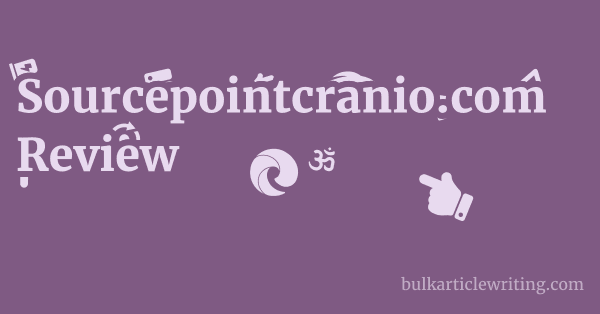Determining if a service is a “scam” requires a careful look at its claims, transparency, and whether it delivers what it promises within reasonable, ethical, and scientific bounds.
Read more about sourcepointcranio.com:
Sourcepointcranio.com Review & First Look: Unpacking the Claims
Sourcepointcranio.com Features: Examining the Modalities and Claims
Sourcepointcranio.com Cons: Significant Drawbacks and Ethical Concerns
Is Sourcepointcranio.com Legit: Assessing Credibility and Ethical Standing
Sourcepointcranio.com Alternatives: Permissible Paths to Well-being
While it’s difficult to definitively label Sourcepointcranio.com a direct “scam” in the financial fraud sense without personal experience or regulatory findings, there are numerous red flags that align with practices commonly seen in exploitative or misleading wellness schemes.
The unproven, esoteric nature of its core offerings strongly suggests it is not a legitimate evidence-based therapeutic service.
Misleading or Unsubstantiated Claims
A significant red flag is the website’s heavy reliance on claims that lack scientific validation.
|
0.0 out of 5 stars (based on 0 reviews)
There are no reviews yet. Be the first one to write one. |
Amazon.com:
Check Amazon for Is Sourcepointcranio.com a Latest Discussions & Reviews: |
Terms like “transmutation of foreign energies,” “chakra balancing,” and addressing “past life trauma” fall into categories of pseudo-science or New Age spiritualism rather than established medical or psychological treatment.
- Absence of Scientific Basis: There is no credible scientific research or clinical evidence provided on the website to support the efficacy of these methods in treating physical pain, anxiety, complex trauma, or “entities.” Such claims are not recognized by mainstream medical or psychological associations.
- Over-promising Outcomes: The website promises profound transformations (“unblocked my root and sacrum,” “pure magic,” “profound shifts,” “healing ripple coming from you”) that are broad and subjective, making it nearly impossible to objectively verify success or failure. This is common in misleading schemes that capitalize on desperation.
- Vague Mechanisms: The “how” section describes techniques like “through body resonance, unwinding, embodied and mindful massage, sound, toning and frequency.” While massage and mindfulness can be beneficial, the integration of “frequency” and “transmutation” without a clear, testable mechanism raises questions about the actual intervention beyond general relaxation.
- Data Point: According to the U.S. Federal Trade Commission (FTC), health scams often share common characteristics, including “claiming to be a ‘secret cure’ or ‘breakthrough,’” and using “personal testimonials” rather than scientific evidence.
Lack of Professional Transparency and Licensing
Legitimate health and wellness professionals are transparent about their qualifications, education, and licensing.
This allows consumers to verify their credentials and ensures accountability.
- Missing Credentials: The website names “Jemma” as the practitioner but does not provide any specific professional licenses (e.g., licensed psychotherapist, physical therapist, medical doctor, or even certified massage therapist credentials from accredited bodies) that would permit her to legally or ethically offer treatments for physical and emotional trauma or claim the ability to interact with “entities.”
- No Regulatory Oversight Mentioned: There’s no indication that the service is overseen by any professional licensing board or regulatory body, which means there are limited avenues for consumer protection or complaint resolution if issues arise.
- “Self-Developed Fusion”: While innovation is good, a “self-developed fusion” that incorporates highly sensitive and complex claims like “trauma release” and “entity transmutation” without a basis in recognized, vetted professional training is a significant red flag. It implies a lack of adherence to established standards of care.
- Data Point: The American Medical Association (AMA) and American Psychological Association (APA) both stress the importance of licensed and evidence-based practice to ensure patient safety and ethical treatment.
High Cost for Unproven Services
The pricing structure, with sessions ranging up to $176 and packages costing several hundred dollars, is significant for services that are not evidence-based and lack scientific backing. Sourcepointcranio.com Alternatives: Permissible Paths to Well-being
- Value for Money: Investing substantial amounts in unproven therapies, especially when legitimate and scientifically validated alternatives exist, is a concern. Clients might spend money on services that offer temporary subjective relief but do not address the underlying issues effectively or provide long-term solutions.
- Pressure for Multiple Sessions: The website explicitly states, “Multiple sessions are common and strongly recommended,” and package deals are offered, encouraging long-term engagement with a service built on unverified claims. This can lead to ongoing financial drain without tangible, measurable benefits.
- Data Point: Consumer watchdog groups often advise caution when services encourage costly, long-term commitments for unproven treatments, especially when clients are in vulnerable states.
Ethical Concerns (Islamic Perspective)
From an Islamic standpoint, the service presents significant ethical and theological problems, elevating these concerns beyond mere lack of scientific proof to a matter of religious permissibility.
- Shirk: The belief in “chakra balancing,” “transmutation of foreign energies,” and “past life trauma” healing implicitly attributes power to created entities or unproven spiritual mechanisms, which can be seen as associating partners with Allah (Shirk). This is a grave sin in Islam.
- Reliance on Other Than Allah: Seeking healing or intervention from unverified spiritual means that are not from the Quran or Sunnah, or from individuals who claim to manipulate unseen forces, goes against the principle of relying solely on Allah for all matters.
- Forbidden Knowledge: Practices that delve into claims of “past lives” or direct manipulation of “entities” without clear Islamic basis venture into areas of the unseen which are forbidden for humans to pursue in such ways.
In conclusion, while one might not definitively call Sourcepointcranio.com a “scam” in the criminal sense without a legal judgment, its strong alignment with characteristics of unproven, ethically questionable, and potentially exploitative wellness practices, especially considering its conflict with Islamic principles, suggests it should be approached with extreme skepticism and caution.
Clients seeking genuine, permissible, and effective help for their well-being are advised to look for alternatives that are professionally licensed, evidence-based, and align with their faith.
Is Sourcepointcranio.com Legit: Assessing Credibility and Ethical Standing

Leave a Reply